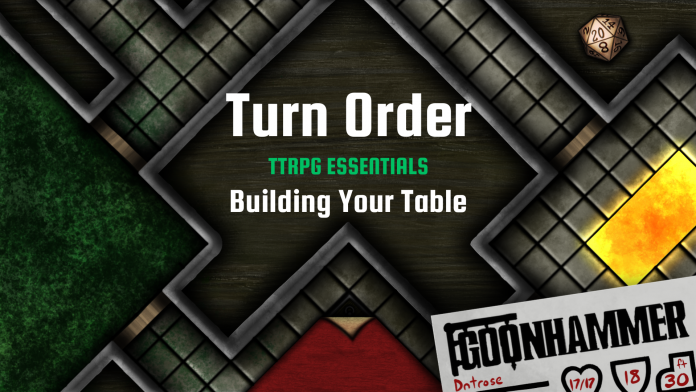So you’ve decided to dip your feet into the ttrpg hobby! That’s great! I’m certain you already have great ideas for systems you want to try, characters you want to build, and thrilling adventures you want to get lost in.
Before you do that though, you’re going to need a table to play at.
No, no, put the tools down. Despite the title to this article, we aren’t talking about building a physical object today. Instead, we’re talking about building a metaphorical one, through methods both mundane and esoteric….
Wait no don’t leave! I swear this will make sense in a few sentences, we’re not just wizardposting here, no matter how it might seem like it.

See, no ttrpg can reach the heights you’ve heard/seen/read/listened/scryed without first having a number of likeminded people to engage with it. To this end, you’ll need to locate a group of individuals to play with. Today, we’re going to explore multiple methods for doing that, as well as a few pieces of advice for the continued enjoyment of both you and those you opt to play beside.
Building or Joining a table
When looking towards exploring this hobby, your options are cleanly delineated between either building your own table or seeking out membership at a pre-existing one, and both have their strengths and weaknesses.
Joining a pre-existing table all but ensures you’ll be joining as a player, and thereby be afforded more opportunities to “learn-by-doing” throughout your experience. However, learning to acclimatize to a pre-existing table can be an adjustment, and the quality of that experience will be entirely dependent on those you’re playing beside. Open communication and adaptation will be key here.
Building a new table likely positions you in the role of DM/GM/Storyteller for the foreseeable future, as any players you bring in might be just as new to the hobby as yourself if not more so. You’ll be looked to for scheduling, rules arbitration, world-building, guidance, etc. However, this isn’t to say this will be an entirely thankless experience, as you’ll have a wonderful opportunity to get closer to your players and to create something wholly unique with them. Open communication, patience, and understanding are key.
Advice in each proceeding segment will include information for both options, so if you’re still uncertain as to which speaks to you best, don’t worry.

In-Person
The usefulness and feasibility of the options I’m going to lay out in this section are entirely dependent on several factors that may be entirely out of your control. To that end, I encourage you to skip forward to the next segment (Online), if you find the options or guidance in this one to be missing the mark of your particular living situation.
Sometimes, finding a group to play with is as simple as going to your local FLGS and seeing if they have any upcoming ttrpg nights or events. Even if neither experience gives you a permanent place to hang your hat, they’ll both introduce you to players and GM’s in the hobby, and give your further play experience.
Similarly, several board game and comic conventions also make a point of keeping a room for ttrpg play and will have tables you can sign up to play at throughout the duration of the con. This can be a great way to try new systems, meet other folks in the hobby, and maybe even give you an easier method for getting your friends to try the hobby alongside you.
Now, if you want to take on the task of starting from scratch and building your own table at home, you have a few different tasks ahead of you. First, you’ll need to identify those people you want to invite to join you. This can be as simple as just floating the option past a few friends and testing the waters, but sometimes I find that it can be more useful to have a pitch ready in your back pocket that goes beyond “Hey wanna try this rad game with me?”, if only because some people interpret ttrpgs as being possessed of an unfamiliar degree of complexity than is true.
For your pitch, you’ll want to make it as simple as possible, as though you were describing one of your favorite movies in about 1-3 sentences. Trying this out with a few of your favorite movies is actually a great way to practice this, as it’ll teach you what immediately jumps out to you as compelling. I also find that referencing recent media can help, providing your friends with something to compare your pitch to, and getting them excited to inhabit a similar story.

Online
Years ago, looking for a playing group within the ttrpg hobby was perhaps a little more onerous than it needed to be. The arrival of the VTT, Discord, and other more specialized software applications improved this in a monumental manner. Case in point, a visible majority of hobbyists that play D&D currently utilize an online application known as D&D Beyond regardless of if they’re playing in person or not. So, lets talk about your options for exploring this hobby through your screen.
Discord is a massive boon for finding great tables of great players, and sometimes it’s as simple as joining a particular TTRPG system’s community discord server (usually shared on their social media) and checking out the LFG channel. Additionally, this will give you a mainline into the actual community of the game you’re interested in, and will often provide streamlined tools to run the system in question for your new table.
There are multiple Virtual Table Top (VTT) platforms (Roll20, Foundry, and Owlbear Rodeo to name only a few) that allow you to run damn near every system under the sun, complete with maps, system reference, and any other system minutia you might want. Some of these platforms are free to use, and others are monthly or one-time payments. Most also have a rather robust LFG functionality, to help you locate a table. Regardless of which one you choose, it’s advisable that you take the time to check out the profile of the GM/DM that posted the game, to ensure that their table methodology matches what you’re after. If you’re planning on running online, each of these platforms can make the effort monumentally easier, as the inbuilt or community-crafted tools for your specific system streamline the entire process.
Our final option isn’t exactly a VTT, and nor is it exactly as free as discord, but it does offer a unique sort of experience. StartPlaying is a pay to play LFG website that allows you to purchase a seat at a professional GM/DM’s table. As before, it’s advised that you mind the profiles and posted reviews of any GM/DM whose table you find yourself interested in. Different games will have different play durations, number of listed sessions, and price points. A definite option if you want a curated experienced and don’t mind paying for it.
Staying Safe
There’s a saying amongst the ttrpg hobby that goes something like “No D&D is better than bad D&D”. You’ll find it repeated across damn near every social media channel and community dedicated to the hobby, and it’s incredibly important to keep in mind when joining a new table.
As with life, some people don’t have your best interests, safety, or comfort in mind. The issue is that in a gamified social space, specifically one with such asymmetrical gameplay, unhealthy dynamics are more common than anyone would like.
The best tool at your disposal to avoid an uncomfortable or uncooperative table is, as you’ll hear us repeat across several articles: communication. A lot of the common stress points across the table can be directly addressed with a direct conversation, good listening skills, and empathy.
Having said that, if an individual at the table is acting unsafe or deliberately harmful, you don’t owe them jack. Nobody should ever be expected to weather or communicate with someone acting out in a bigoted or harmful manner, and you certainly don’t owe them one damn second of your patience or time.
The ttrpg hobby should always be a safe and comfortable space for players of all walks of life, and anybody that thinks otherwise doesn’t deserve a table.
If you’re forming your first table, I advise starting with a simple conversation about topics, themes, and content that your players might like to avoid at the table. There are even several tools online to help you expediate this process.
UP NEXT IN ESSENTIALS: Picking your first TTRPG!


